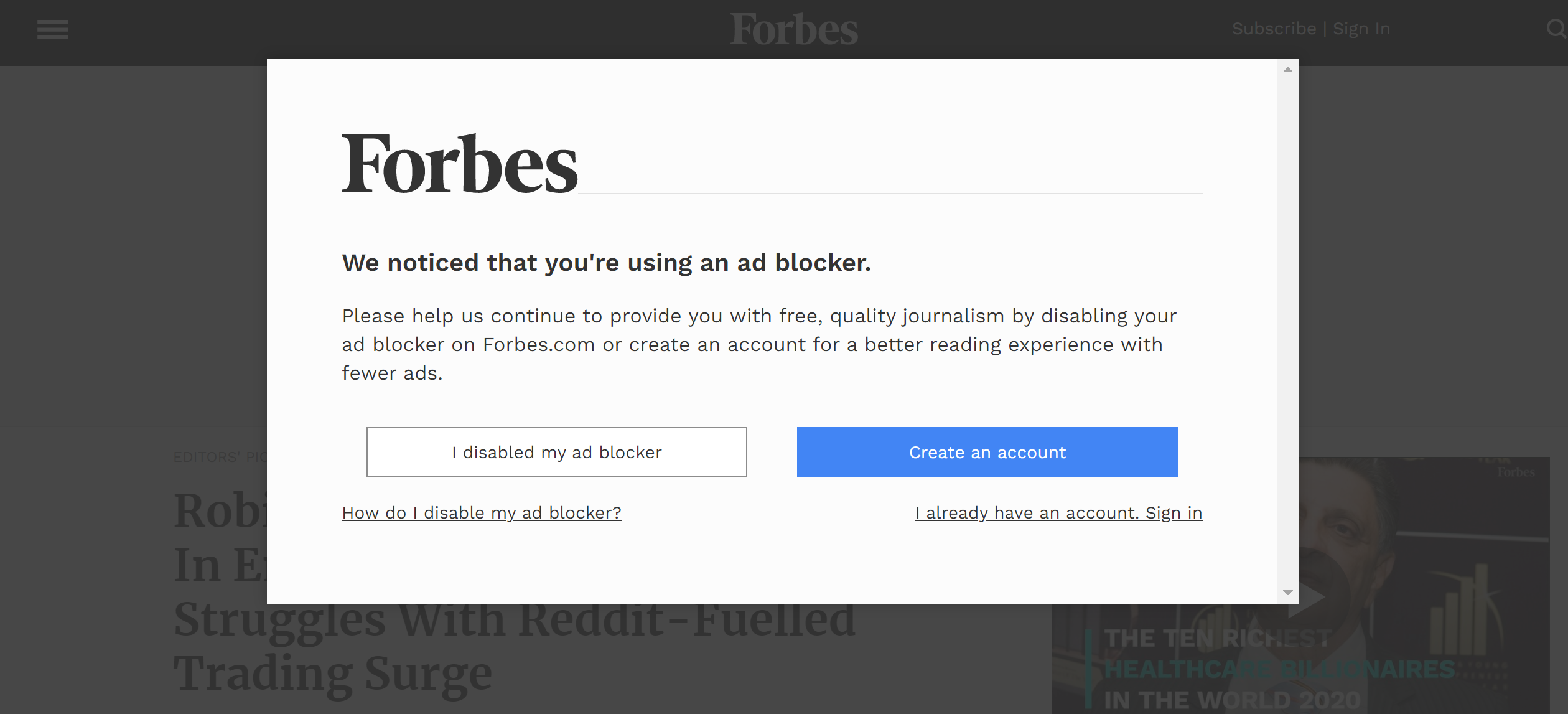Why Adblocking Is So Problematic
According to Wikipedia, adblocking is a software capability for blocking or altering online ads in a web browser. This often comes in the form of a browser extension, such as Adblock Plus.
Why do some users go through the hassle of installing adblocking extensions? Because online ads suck. While most websites moderate their use of ads, some sites shamelessly bombard users with intrusive ads, to the point where there seems to be more ads than content on the screen.

This is a typical article from Forbes
This poses a significant problem for publishers who rely heavily on ad revenue. The increasing adoption of adblockers has caused publishers to feel the pinch. These publishers have 3 main solutions:
Solution 1: Increase ads for non-adblocker users
Publishers will increase the number of ads for non-adblocker users, while adblocker users will continue to enjoy ad-free content. The basic premise is that increasing ads will counteract the revenue loss from adblocker users.
The key benefit of this approach is the minimal loss of engagement. Since all readers are allowed access to content, the publisher will enjoy a larger audience, more social media publicity, and better Google rankings (aka online visibility). These factors are crucial for a publisher's long-term survival.
But this solution has a fatal flaw. Increasing ads for non-adblocker users will likely cause these users to start adopting adblockers. As the proportion of adblocker users increase, publishers are forced to increase ads once again, which leads to more adblocker users...the vicious cycle continues. And let's not forget, some users may simply never visit the site again.
Judging by this solution's lack of adoption amongst publishers, increasing ads is likely unsustainable.
Solution 2: Force users to disable adblockers

Forbes employing the Wall strategy
Commonly known as the Wall strategy, adblocker users are forced to whitelist the page/site to access content. Wall strategy is used by Forbes and many other free online publishers.
This strategy's main advantage is that it maximizes profits generated from adblocker users, or at least in the short term. The publisher does not waste bandwidth on users who do not generate revenue and revenue from adblocker users who can tolerate the ads are captured.
But this comes at a cost of engagement. A significant portion of adblocker users may choose not to whitelist. This could have serious long-term effects for the publisher.
In terms of pros and cons, Wall strategy is the complete opposite of the previous solution.
Solution 3: Display Acceptable Ads to adblocking users
Acceptable Ads is an initiative started by Adblock Plus to allow publishers to display non-intrusive ads to adblocking users. Ad placement guidelines are decided by an independent Acceptable Ads Committee. The catch is that large publishers must pay the Program a fee to participate.
Acceptable Ads strikes the middle ground between the previous two solutions. Publishers do not lose engagement and can still profit from adblocking users, albeit at a significantly curtailed margin.
However, publishers who adopt Acceptable Ads are threading on thin ice. Adblocker companies set the rules and publishers who rely on them have no negotiating power. Some have even compared Acceptable Ads to the mafia. Publishers may be forced to accept increasing fees and stricter ad placement guidelines, making Acceptable Ads too risky for any major publisher.
What can we do?
While most of this article talks about adblocking from a publisher's perspective, the sustainability of free online publishing is nonetheless important for us. We often take for granted the amount of free content on the internet. Yet, these journalists must still be paid somehow.
If these free publishers can't find a way to keep going, we may end up with paywalls everywhere, a situation arguably worse than intrusive ads.
So here's what we can do:
-
Disable your adblocker on the whole site. Choose the media sites you frequent the most and support their work by allowing them to show ads.
-
Donate to a publisher. Some sites like The Guardian are actively looking for donations to stay afloat. Keeping in mind how much you save not having to buy newspapers, donating some money isn't very hard to justify.

Popup by Guardian
Adblocking has given web users a better experience, but it has also created an existential crisis for many online news websites. The solutions available to free publishers aren't without major downsides.
This tug of war between users and publishers, where the stakes are people's jobs and accessibility of content, is what makes adblockers so problematic.